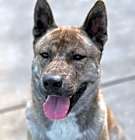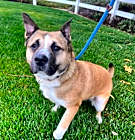A full-grown male Akita will be 24 to 28 inches tall and weigh between 60 and 121 pounds. Female Akitas are slightly smaller when full-grown, standing between 24 and 26 inches tall and weighing between 60 and 100 pounds.

$350 in savings for new adopters
PetSmart is offering new adopters a free adoption kit. Just show your adoption paperwork in-store to redeem!
PetSmart is offering new adopters a free adoption kit. Just show your adoption paperwork in-store to redeem!
Shop Now

Shop Now



















